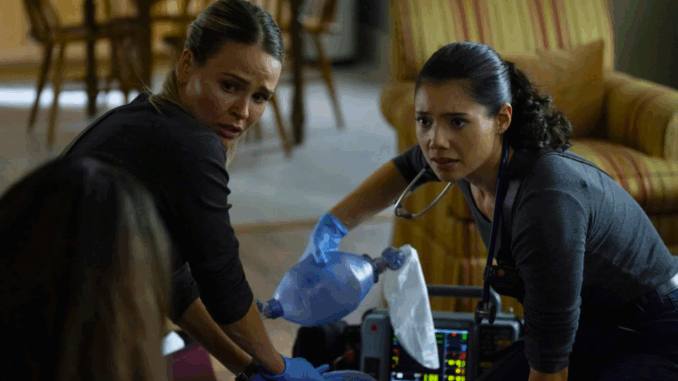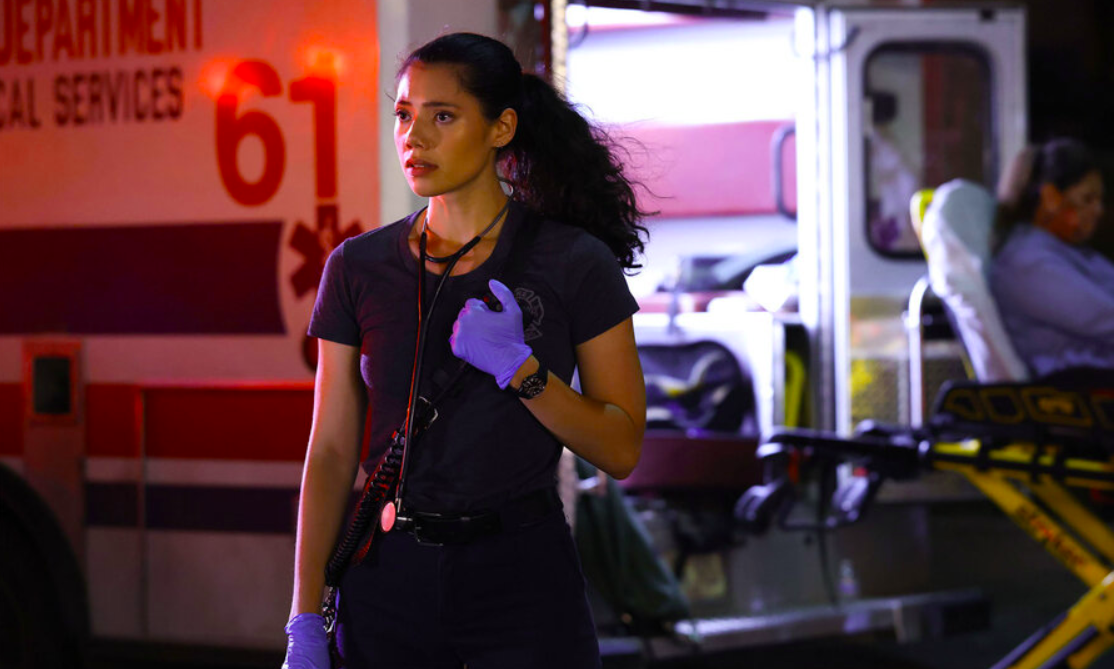
A Night That Should Have Been Routine
It was supposed to be a quiet shift. But Chicago Fire has never been about routine.
What started as a call to assist in an accident on the outskirts of the city quickly turned into a nightmare when one of their own, Firefighter Cruz, was caught in a crash during an emergency response.
The scene was chaotic. A two-car collision had left multiple victims trapped, but it wasn’t the wreckage that stopped Cruz in his tracks. It was the screeching sirens and flashing lights of an approaching ambulance that couldn’t stop in time, slamming into the fire truck with an intensity that sent Cruz flying.
His colleagues were thrown into survival mode, rushing to stabilize him while fighting the panic that churned in their stomachs.
A Team Torn Apart
In moments like these, Chicago Fire shows the raw emotion that underpins the world of first responders. Boden immediately took command, ordering everyone to focus on Cruz while ensuring the other victims were safely handled.
But for the team, this wasn’t just another call. Cruz was one of their own, their brother. The man who had saved their lives countless times, the man who had cheered them up during the hardest shifts.
Severide and Casey stood helplessly over Cruz as paramedics worked quickly to assess his injuries. “Stay with us, buddy,” Severide whispered under his breath, eyes full of fear he rarely allowed to show.
Meanwhile, Herrmann and Mouch coordinated with the ambulance team, trying to prevent further chaos. The firehouse team was now in a race against time, not to save civilians this time, but to save one of their own.
The Struggle to Hold On

The ambulance ride to the hospital was tense. Every bump in the road, every jolt felt like an eternity. Cruz lay unconscious, his body bruised and battered from the crash, his colleagues beside him, hoping against hope.
As the team arrived at the hospital, Boden was already on the phone with his wife. “Keep the faith, Casey,” he muttered, not knowing if Cruz would make it.
Hours later, as the team waited in the emergency room, they reflected on the nature of their job. A job where even the bravest, strongest among them can be the next victim.
The Hospital Drama: Waiting for News
The team’s wait felt endless. Time stretched out as they clung to any shred of hope that Cruz would make it through. In the sterile, impersonal halls of the hospital, they found solace in each other’s company. Boden, the stoic leader, had a rare moment of vulnerability, pacing as the hours passed, unable to sit still.
Finally, the doctor emerged, delivering the news they had been dreading. Cruz was in critical condition but had pulled through the worst of it. His survival was uncertain, but there was a glimmer of hope.
Recovery and Redemption: A Long Road Ahead
The days following Cruz’s accident were filled with uncertainty. The crew visited him daily, providing the kind of support only family could offer.
Even in his weakened state, Cruz showed the same unbreakable spirit that had always defined him. He struggled to speak but was determined to return to the team. “I’m not done yet,” he managed, his voice hoarse.
The hospital scenes were raw with emotion. The crew realized just how fragile their lives were. Their bond was now deeper than ever, not just because they saved lives, but because they shared in each other’s losses and victories.
The Ultimate Test of Brotherhood
What the team didn’t realize in those harrowing hours of Cruz’s recovery was that they had passed their ultimate test. It wasn’t just about fighting fires anymore. It was about protecting each other, fighting to bring each other back from the brink, no matter what.
Cruz’s recovery wasn’t easy, but it was a testament to the strength of Chicago Fire — a team forged in fire and never willing to let one of their own fall. When Cruz finally returned to the station, the room erupted in cheers. He was back. And so was the family that defined Firehouse 51.